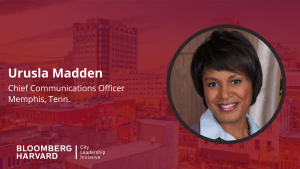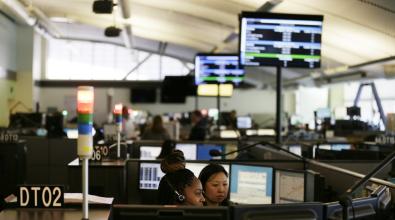City leaders share lessons on how to be a better negotiator

Negotiation is a critical skill for all city leaders—not just the people who take on the big labor agreements or development deals.
That’s because negotiation actually is something we all do, all the time, pretty much every day. Even just agreeing on a time for your next meeting might involve some dealmaking.
This is also a skill that every city leader can get better at. That’s why it’s a core part of the executive training mayors and senior city leaders get annually through the Bloomberg Harvard City Leadership Initiative. It’s also why the Initiative in June convened the first session of the Negotiation for City Leaders program, a special training program for city practitioners based on a newly developed curriculum built especially to help them become stronger negotiators.
Senior leaders from 26 city halls around the world took part in four days of activities, simulations, peer-to-peer consultations, and discussions with experts from the Harvard Business School, Harvard Kennedy School, and Bloomberg Philanthropies. The goal: To emphasize the importance of negotiation skills in driving government innovation and to offer practical ways for city leaders to get better at it.
Bloomberg Cities caught up with some of the session participants to see what their biggest takeaways were and how they’ve put what they’ve learned to work on behalf of city residents.
The session empowered me. From a cultural and gender perspective, I've always thought of negotiations as exhausting, tedious, and pointless. However, one of the many things that I learned was understanding the concept of power—specifically the power that one has when in negotiations. It’s not a zero-sum game. You have to understand that this is a partnership and the act of negotiation oftentimes takes an open mind and an understanding about what people really want and need.
Negotiations can be aggressive, and at times uncomfortable, but necessary. I now know that I shouldn’t shy away from it, but lean in. In reality, it's a format to listen, ask questions, explore, and have a conversation. Understanding how to leverage this skillset is empowering and has been a game changer for me.
[Read: Enhancing your effectiveness as a negotiator]
As public servants, our work is centered on serving our community and collaborating across city departments; the training opened my eyes to the fact that negotiation and collaboration are two critical sides of the same coin. My colleagues and I returned to work feeling energized and inspired to consider all angles of a negotiation, and we agreed to be resources to each other and our departments moving forward.
A major takeaway and tool that I’ve implemented is to enter into negotiations or situations with a BATNA (Best Alternative to Negotiated Agreement) to what I desire but yet still meet the need and be reasonable. This practice has minimized time, unnecessary efforts, energy, and frustrations that I experienced immensely prior to this class. I also feel more accomplished as I spend more time thinking through the issue and all possible alternatives or scenarios beforehand.
Another practice I’ve implemented is slowing down to prepare properly for negotiations or slow down a situation to fully understand it entirely. I am intentional on a resolution that works for everyone, especially with my team members, as this is where I spend more time negotiating on a weekly basis.
[Read: How every city leader can get better at negotiation]
What I sincerely value about the program is all those colleagues from different cities and relationships we’ve built by sharing our knowledge, best practices, and problems our cities have to deal with. Now we can count on each other for help and good advice, which is priceless no matter time difference or the distance.
The key lesson I took away is the way of thinking before you enter the room for negotiation. Negotiation is more than a path to some agreement which is supposed to bring victory to your team. Goals definitely matter, but how you choose to make them happen matters more. In the first place, negotiation is about people in the room and listening to them, actually hearing what they’re talking about and responding, not just reacting.
The key lesson for me: Always prepare and plan for negotiations by knowing what your BATNA and your Zone of Possible Agreement (ZOPA) are before going to the table.
In labor negotiations, I always meet with the interested parties on my side to manage expectations and to discuss what we want to accomplish within reason. We also discuss how to leverage what we have to offer in order to get the changes we need. Ask yourself, “What can I do within reason to help accomplish your goals?” Before going to the negotiation table, know who the parties are and what are the underlying issues. Always be cognizant of other people’s emotions or cries for help.
Our senior leadership team has been able to put our training into action, most recently with an agreement with a local developer to build a luxury hotel. We went into the negotiation with this mindset: What can we do for this developer that presents the least risk to the taxpayers and how do we get a return on this investment?
We had to take our stakeholders into consideration, which included our City Council. The development also has a large minority ownership component, and we certainly wanted to see that realized in a majority African American city. And the public was not short on opinions about the city using tax dollars in a private development. While we kept working toward a new deal, we also thought carefully about what it would mean if we couldn’t reach an agreement. The conclusion was that it wouldn’t be great, but the city would be fine.
Finally, we reached an agreement that is a low risk to taxpayers, and Memphis is going to get a great property. We view this as a win for the city, the developer, and the administration.







